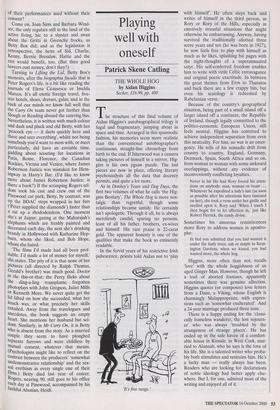Playing well with oneself
Patrick Skene Catling
THE WHOLE HOG by Aidan Higgins Secker, £16.99, pp. 400 The structure of this final volume of Aidan Higgins's autobiographical trilogy is fugal and fragmentary, jumping about in space and time. Arranged in this spasmodic fashion, his memories seem more realistic than the conventional autobiographer's continuous, straight-line chronology from birth to the end. If Isherwood was a camera taking pictures of himself in a mirror, Hig- gins is his own jigsaw puzzle. The last pieces are now in place, offering literary psychoanalysts all the data that decency permits, and quite a lot more.
As in Donkey's Years and Dog Days, the first two volumes of what he calls 'the Hig- gins Bestiary', The Whole Hog is more nos- talgic than regretful, though some relationships became untidy. He certainly isn't apologetic. Through it all, he is always mercilessly candid, sparing no persons, least of all his father, brothers, ex-wives and himself. His rare praise is 22-carat gold. The apparent honesty is one of the qualities that make the book so eminently readable.
In the fervid years of his restrictive Irish pubescence, priests told Aidan not to 'play 'It's free range.' with himself. He often steps back and writes of himself in the third person, as Rory or Rory of the Hills, especially in emotively stressful situations that might otherwise be embarrassing. Anyway, having survived the traditionally allotted three score years and ten (he was born in 1927), he now feels free to play with himself as much as he likes, splashing his pages with the night-thoughts of a superannuated satyr. His self-conferred freedom enables him to write with virile Celtic extravagance and original poetic exactitude. In between the great themes from Eros to Thanatos and back there are a few crappy bits, but even his scatology is redeemed by Rabelaisian verve.
Because of the country's geographical situation, being part of a small island off a larger island off a continent, the Republic of Ireland, though legally committed to the politico-economic European Union, still feels neutral. Higgins has contrived to achieve independent separation from even this neutrality. For him, no war is an emer- gency. He tells of his nomadic drift from country to country, England, Germany, Denmark, Spain, South Africa and so on, from woman to woman with some awkward overlappings, without any evidence of inconveniently conflicting loyalties.
Never in his life had Rory forced his atten- tions on anybody, man, woman or beast .... Whenever he expedited a lady's lust (as soon as possible after his attentions have fastened on her), she took a venu under her girdle and swelled upon it. Rory said 'When I touch I then begin for to let affection in,' just like Robert Herrick, the randy divine.
Sometimes his amorous reminiscences move Rory to address women in apostro- phe:
In bed you admitted that you had wanted it under the leafy trees, ash or maple in Kens- ' ington Gardens, when we kissed, you had wanted more, the whole hog.
Higgins, more often than not, recalls `love' with the whole hoggishness of an aged Ginger Man. However, though he left a trail of aborted foetuses, apparently sometimes there was genuine affection. Higgins quotes (or composes) love letters from a Dane, a Viking, whose English is charmingly Malappropriate, with expres- sions such as 'somewhat exalterated'. And a 24-year marriage produced three sons.
There is a happy ending for the 'classi- cally homeless wanderer, the lost sojourn- er' who was always 'troubled by the strangeness of strange places'. He has ended up in the safe haven of a comfort- able house in Kinsale, in West Cork, mar- ried to Alannah, who he says is the love of his life. She is a talented writer who proba- bly both stimulates and restrains him. He's a lucky man — really always has been. Readers who are looking for declarations of noble ideology had better apply else- where. But I, for one, admired most of the writing and enjoyed all of it.


















































































 Previous page
Previous page